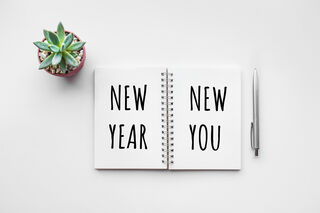Diet
New Year, New You?: 3 Tips for Dealing With Diet Culture
A conversation about confronting diet culture.
Posted December 15, 2021 Reviewed by Jessica Schrader
Key points
- The start of a new year always brings intense advertising for weight loss products.
- It's important to accept that your body will change over time.
- There are good reasons to push back against diet culture.
Alli Spotts-De Lazzar is a Psychology Today blogger, author, and psychotherapist who specializes in treating body dissatisfaction and eating disorders.

Charlotte: Alli, how are you feeling as 2021 comes to a close and 2022 ("New year, new you!”) is around the corner? Diet season is nearly upon us.
Alli: I’m fine with 2021 flipping to 2022. I use birthdays and New Year’s as cues to reflect, assess, and plan. Other than that, I don’t have a lot of attachment to the numbers.
Regarding diet season, it’s probably going to be especially intense after nearly two years of various lockdowns. I suspect the marketing for diets, lifestyles, and wellness programs is going to come at us strongly and boldly.
What about you, Charlotte?
Charlotte: There’s a part of me that has always loved the promise of New Year’s resolutions. I don’t make resolutions, given their terrible track record. But I believe in self-improvement and the potential for us all to become healthier and happier. I just don’t believe in diets.
Alli: I always liked your tag of “Smart People Don’t Diet."
Charlotte: I’m not sure that I’d title a book Smart People Don’t Diet anymore (that book was published in 2014), because I think everyone diets at some point! I wanted to appeal to people’s intellectual side; I figured the most likely audience for that book was people who were willing to be thoughtful about the data on dieting, because the lure of diet culture is hard to resist. We’re all emotional creatures who want what advertisements for diets seem to offer: happiness, health, social acceptance, success.
Alli: Anything that promises you the life you want can be hard to resist, right? The way diet programs and health plans are promoted, they look like they’ll provide you with not only improved wellness or weight loss but popularity, confidence, and good health, too. Sadly, though, a lot of even the “it’s not a diet" diets fail in time. Usually, the person thinks they failed the diet when in reality, they weren’t set up for success by it. Sometimes the person then spends years trying harder, obsessing, experiencing unbalanced nutrition due to food restriction, or even developing a clinical eating disorder. I think it’s mind-blowing, sad, and ugly how industries seem to prey on people’s hopes and vulnerabilities.
Charlotte, why (or how) did you determine that diets don’t work? I imagine you may have started out like so many of us: dieting to be healthier or accomplish some other positive that diets claim to offer. What happened to lead you to write four fantastic books on non-dieting and body image?
Charlotte: I think I followed a somewhat typical path through adolescent insecurity and attempts to reshape a developing body that wasn’t what I wished it was. When I started to study psychology as an undergraduate, I ended up conducting research on body image, eating behaviors, and eating disorders. The more I read the literature, the more I realized how consistent the research was (in terms of dieting not leading to lasting weight loss) and how out of sync the public messaging about weight loss is with what researchers know. It made me mad. It still makes me mad! It’s false advertising!
But, I do understand the temptation to try a new diet. Some days you don’t feel great about yourself and you want to do … something! Alli, how do you deal with the days where you just feel uncomfortable in your own body. You feel “blah,” and then you see some ad on Instagram for a juice cleanse or something that you know is BS, but … how do you resist that messaging?
Alli: I flow with my experiences, and sometimes that means to feel “uncomfortable” and “blah.” In fact, my body has been trying to get me into menopause, and that is stupendously uncomfortable! It’s no longer predictable for menses, I get cranky easily and unpredictably, I have hot flashes and youth-like zits sometimes, and my body has morphed into a bunch of geometric shapes that no longer fit clothes the same way. Honestly, I think it’s pretty funny (in a twisted way) most of the time, and I try to age with bumbling grace.
Something foundational that I think helped me to accept my body’s changes is this: My OB-GYN had information about and pictures of the female body’s natural progression throughout each decade. So, I’m not freaked out by what’s happening. I’m right on schedule. Besides, I’m so grateful for my body recovering and healing from all the cruddy diets I’ve done to it, from years of exercise abuse and eating disorders, and from not taking good care of it in my youth. My body is my friend because it has served me and continues to support what my mind and heart want to pursue.
To some readers, my attitude may sound unreal. I get that. It was not automatic or instant and has evolved—with work—over the years.
Charlotte, first, how do you deal with the days where you just feel uncomfortable in your own body. And second, what do you wish for anyone reading this conversation between two professionals to take from it?
Charlotte: Alli, I think I’ve learned to be patient when I don’t feel comfortable in my body. I know we all have days when we feel “blah” and I know sometimes it has to do with my own behaviors (e.g., whether I’ve had time to exercise or not in recent days), but sometimes my body is just doing its own thing. It may be hormones or often I think that I’m just tired. A good night’s sleep, some enjoyable exercise, and time with a friend unwinding can do a lot for my state of mind and how I feel physically. But, no one likes to feel uncomfortable.
We could go on and on discussing our thoughts about body image and dieting. Let's conclude by offering a few ideas for your consideration—especially for the days you might feel “uncomfortable” and “blah” about your body. Though we both identify as female, the following can help any gender.
1. Learn what soothes you and do it when you’re having a bad body day.
We both feel it’s important to practice what we preach, but this isn’t to say it is always easy (though it does get easier with time and practice). It requires becoming aware of not just what leads us to feel bad about ourselves, but also what makes us feel better. There is no one-size-fits-all coping strategy that will work for everyone. Learn what works for you, whether it be going to bed early and getting a good night’s sleep or calling a friend when you need a distraction or support.
2. Accept that your body will change over time.
As Alli noted, knowing what to expect as she aged helped normalize changes and discomfort. When we see celebrities who are 60 and look 35, it is easy to think that our bodies can just stay the same. But, our bodies and appearance change all the time! It is normal to not be the same size or shape you were in high school—or even a year ago.
3. Defy diet culture—for your own good and for others’ benefit, too
It can be helpful to remember that going on a diet doesn’t potentially just damage your own health, but can also damage others’ health through the example you set. Similarly, defying diet culture—refusing to try fad diets, discussing calories or carbs, or comparing our bodies to others’ bodies—sets an example that you value yourself for more than your appearance and you respect your body.
We think it’s important to be honest in discussions of body image issues. Even we “experts” have off days occasionally. How we feel about ourselves and how we take care of ourselves varies, which is pretty natural. And, we’ve experienced that a peaceful relationship with your body can be possible. Rejecting diet culture is an important part of our mental health—and yours, too.




